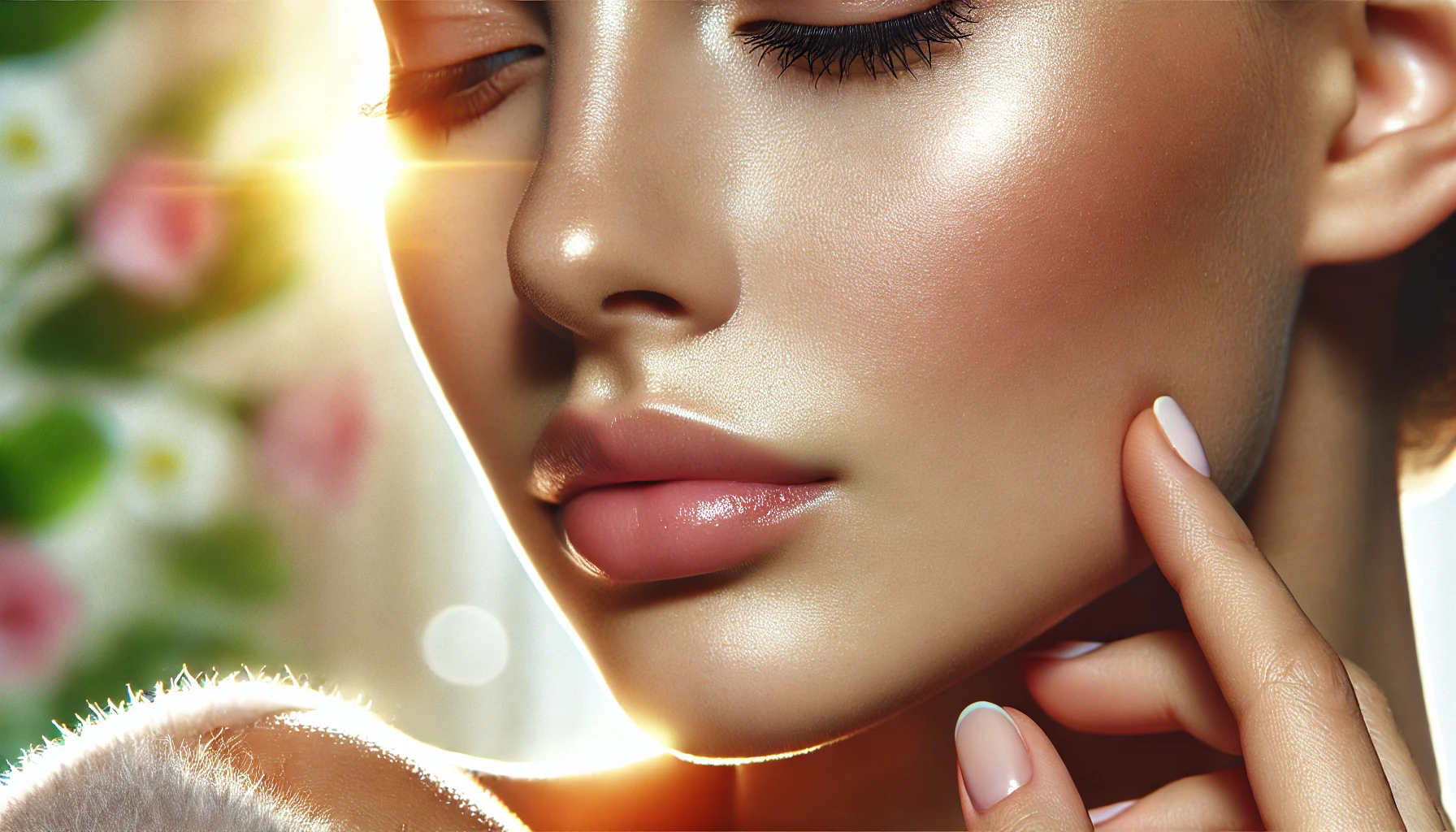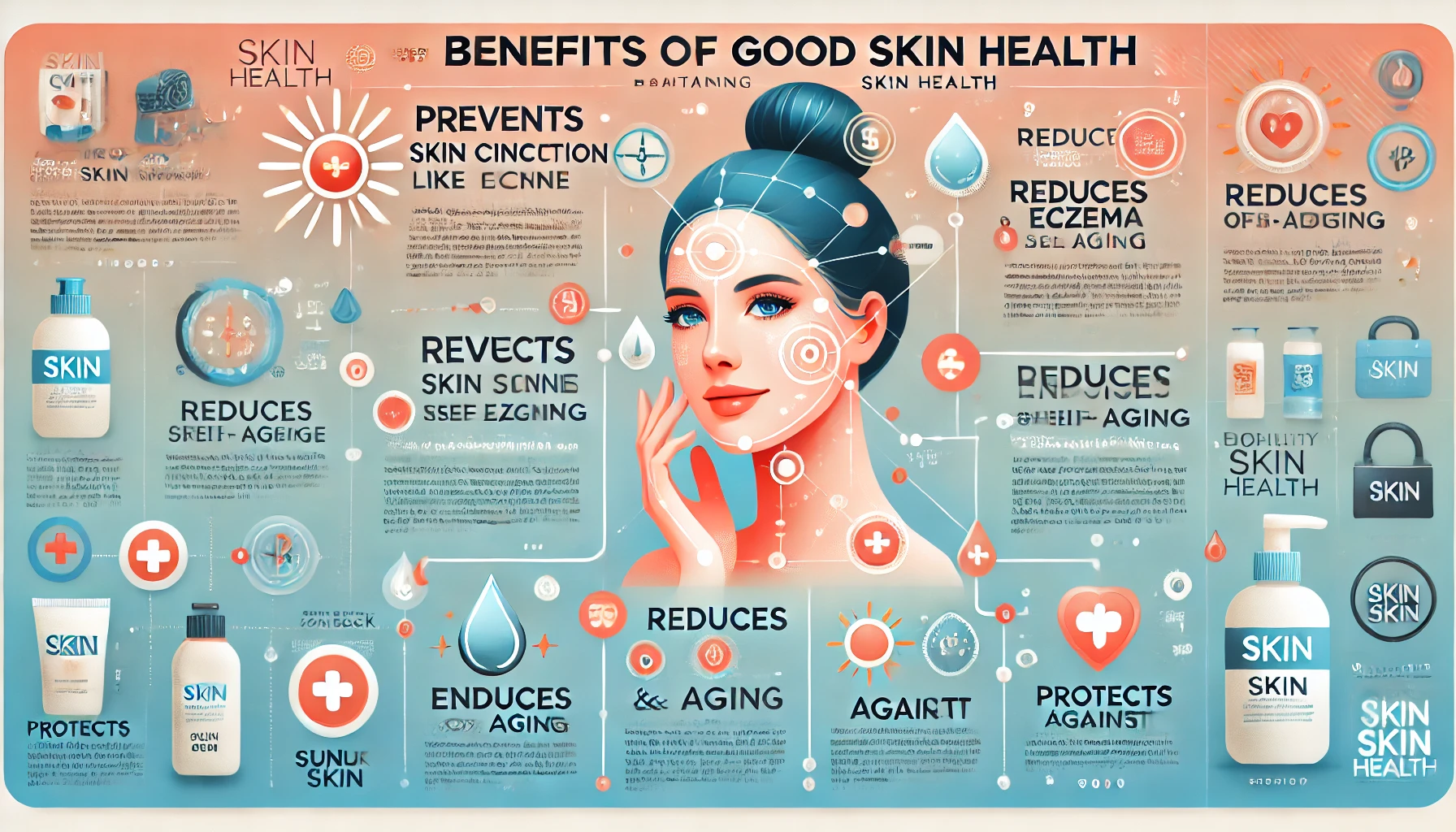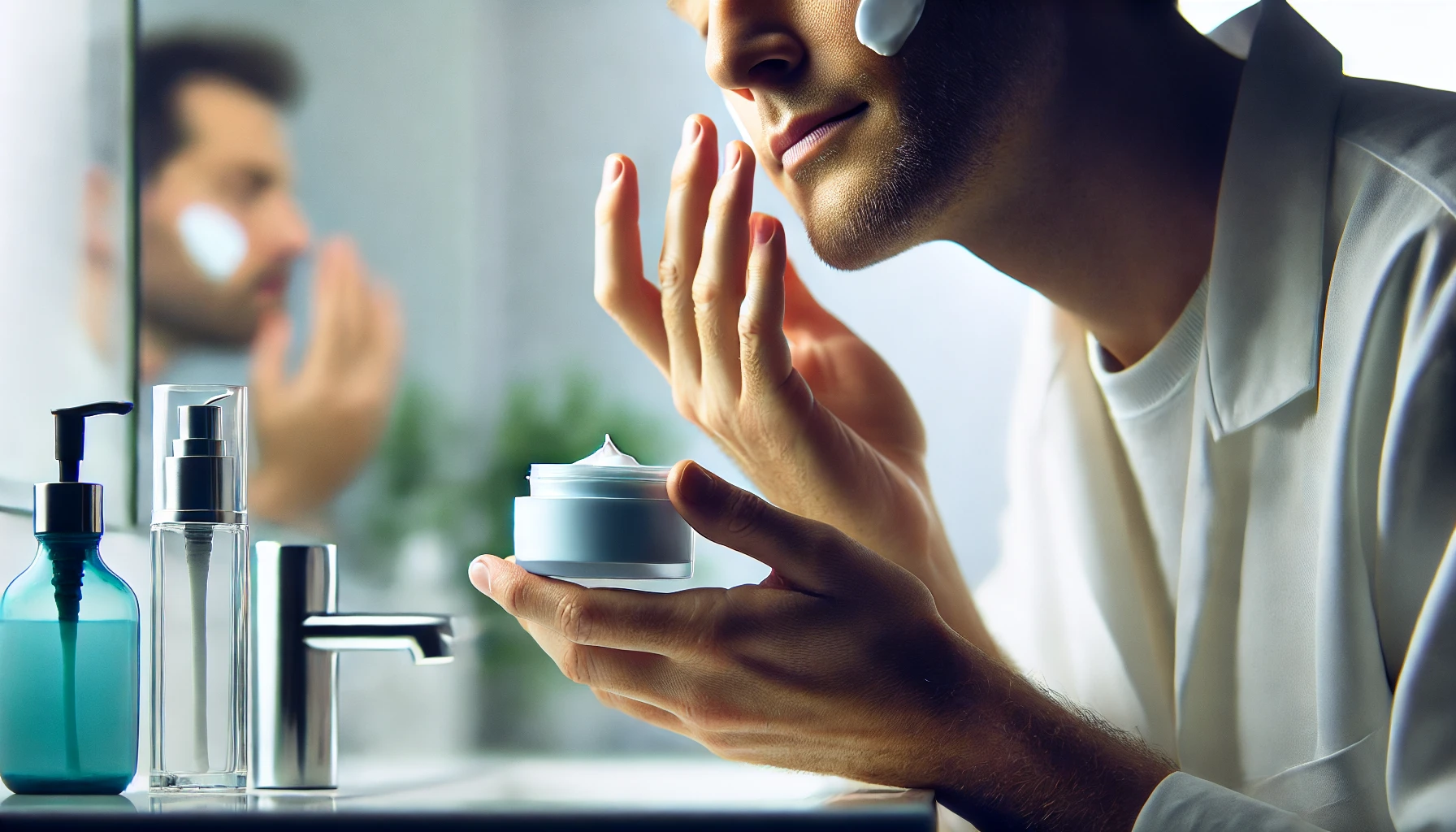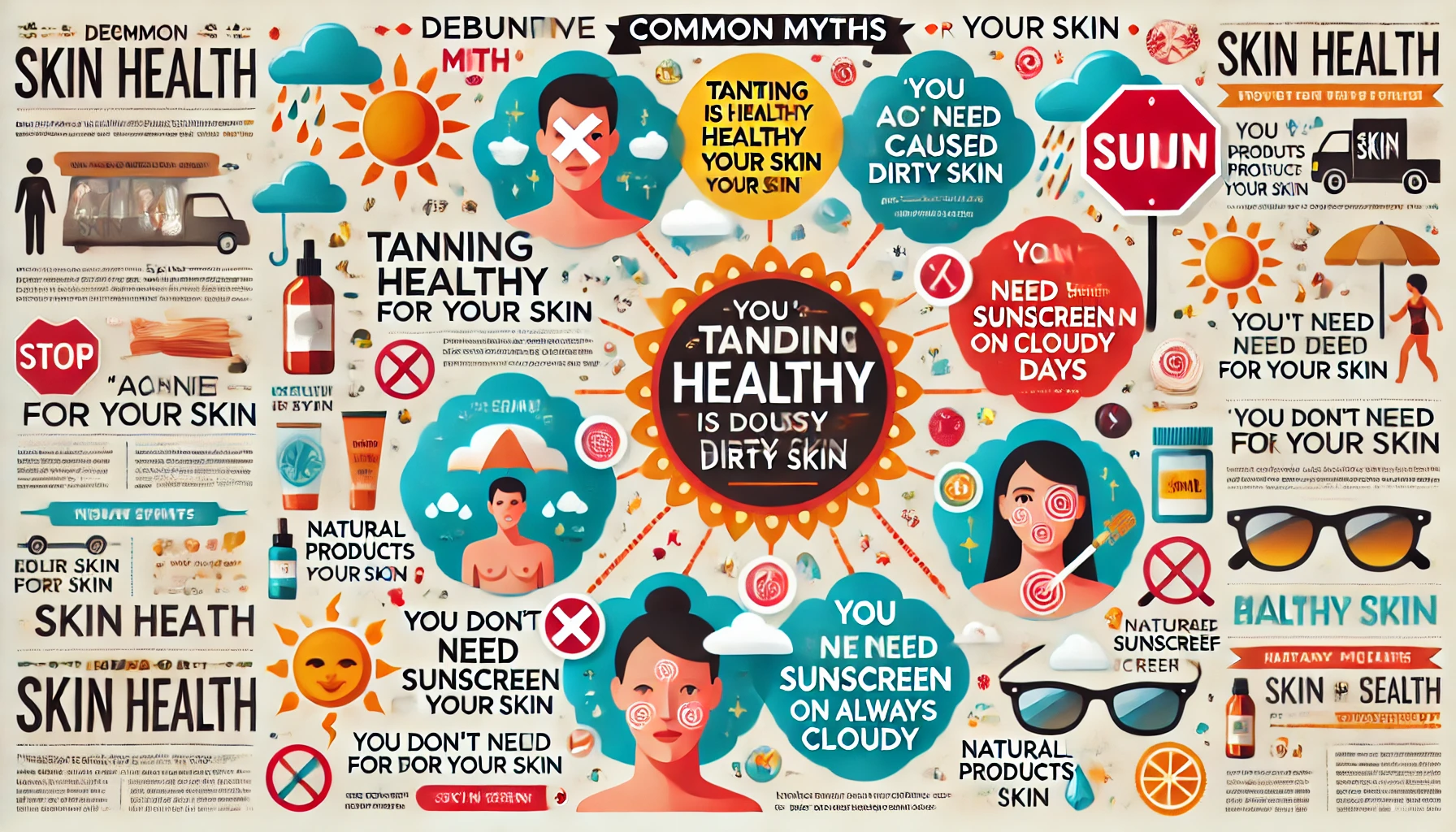Skin Health: Maintaining Healthy Skin
Dr. Emily Green
24 Sep 2024 • 10 min read
Introduction to Skin Health
Your skin is the body’s largest organ, acting as a protective barrier against environmental factors, regulating temperature, and playing a vital role in overall health. Healthy skin is not just about appearance; it’s an indicator of your internal health. Maintaining good skin health involves a combination of proper skincare routines, sun protection, hydration, and a balanced diet.

Importance of Skin Health
Good skin health is essential for several reasons:
- Protection: The skin protects the body from external harm, such as bacteria, viruses, and pollutants.
- Temperature Regulation: The skin helps maintain the body’s temperature through sweat and blood circulation.
- Sensation: It enables us to feel touch, pain, and temperature, which are crucial for protection and interaction with the environment.
- Aesthetic Appeal: Healthy skin contributes to overall appearance and confidence.
- Overall Health Indicator: Skin conditions can be early signs of internal health issues, such as allergies, infections, or even systemic diseases.

Key Components of Skin Health
Daily Skincare Routine
A consistent skincare routine tailored to your skin type is crucial for maintaining healthy skin.
- Cleansing: Use a gentle cleanser twice daily to remove dirt, oil, and impurities without stripping the skin’s natural oils.
- Moisturizing: Apply a moisturizer after cleansing to hydrate the skin and maintain its barrier function.
- Sun Protection: Sunscreen is vital for preventing sun damage, premature aging, and skin cancer.
- Exfoliation: Regular exfoliation removes dead skin cells and promotes cell turnover.

Hydration
Hydration is essential for maintaining the skin’s elasticity and overall health.
- Drink Water: Aim to drink at least 8 glasses of water daily to keep the skin hydrated and flush out toxins.
- Humidifiers: In dry environments, using a humidifier can help maintain the skin’s moisture levels.
- Hydrating Products: Incorporate hydrating ingredients like hyaluronic acid, glycerin, and aloe vera into your skincare routine.

Balanced Diet
A healthy diet is crucial for maintaining good skin. What you eat affects your skin’s condition.
- Antioxidants: Foods rich in antioxidants, such as berries, nuts, and green leafy vegetables, protect the skin from free radical damage.
- Healthy Fats: Omega-3 fatty acids found in fish, flaxseeds, and walnuts help maintain the skin’s moisture barrier and reduce inflammation.
- Vitamins and Minerals: Ensure your diet includes vitamins A, C, E, and zinc, which are vital for skin health and repair.
- Limit Sugar and Processed Foods: Excess sugar and processed foods can lead to breakouts and dull skin.

Sun Protection
Sun exposure is one of the leading causes of skin damage, premature aging, and skin cancer.
- Sunscreen: Apply a broad-spectrum sunscreen with at least SPF 30 every day, even on cloudy days or when indoors near windows.
- Protective Clothing: Wear wide-brimmed hats, sunglasses, and long sleeves when spending extended time outdoors.
- Avoid Peak Sun Hours: Seek shade and avoid direct sun exposure between 10 a.m. and 4 p.m.

Stress Management
Stress can trigger skin problems such as acne, eczema, and psoriasis.
- Relaxation Techniques: Engage in stress-reducing activities like meditation, yoga, or deep breathing exercises.
- Adequate Sleep: Aim for 7-9 hours of quality sleep per night to allow the skin to repair and regenerate.
- Physical Activity: Regular exercise helps reduce stress, improve circulation, and promote healthy skin.

Common Skin Conditions and Their Prevention
Acne
Acne is caused by clogged hair follicles with oil, dead skin cells, and bacteria, leading to pimples, blackheads, and cysts.
- Prevention: Keep your skin clean, avoid touching your face, use non-comedogenic products, and manage stress.

Eczema (Atopic Dermatitis)
Eczema is a chronic skin condition characterized by itchy, inflamed, and dry skin.
- Prevention: Use gentle, fragrance-free skincare products, keep your skin moisturized, avoid known triggers, and manage stress.

Psoriasis
Psoriasis is an autoimmune condition that causes rapid skin cell turnover, leading to red, scaly patches on the skin.
- Prevention: Managing stress, avoiding triggers, and following a dermatologist-recommended treatment plan can help control symptoms.

Rosacea
Rosacea is a chronic skin condition that causes redness, visible blood vessels, and sometimes acne-like bumps on the face.
- Prevention: Avoid triggers such as spicy foods, alcohol, extreme temperatures, and stress. Use gentle skincare products and sun protection.

Skin Cancer
Skin cancer is the uncontrolled growth of abnormal skin cells, often due to prolonged sun exposure or tanning beds.
- Prevention: Use sunscreen daily, avoid tanning beds, and have regular skin checks by a dermatologist.

Common Myths About Skin Health
Myth 1
Tanning is healthy because it gives you a 'healthy glow.'
- Fact: Tanning damages the skin and increases the risk of skin cancer.
Myth 2
You only need sunscreen on sunny days.
- Fact: UV rays can penetrate clouds and windows, so sunscreen is necessary every day.
Myth 3
Popping pimples helps them heal faster.
- Fact: Popping pimples can lead to scarring, infection, and more breakouts.
Myth 4
Expensive skincare products are always better.
- Fact: The effectiveness of a product depends on its ingredients, not its price.
Myth 5
Washing your face more often prevents acne.
- Fact: Over-washing can strip the skin of natural oils, leading to irritation and more breakouts.

Advances in Skin Health Care
Advancements in skin health care and technology have made skincare more effective and accessible:
- Laser Treatments: Lasers are used for various skin concerns, including acne scars, wrinkles, and pigmentation issues.
- Chemical Peels: These treatments remove the top layer of skin to reveal smoother, clearer skin underneath.
- Microneedling: This minimally invasive treatment uses tiny needles to stimulate collagen production, improving skin texture.
- Dermal Fillers: Injectable fillers can smooth wrinkles, restore volume, and enhance facial contours.
- Advanced Skincare Ingredients: Ingredients like retinoids, hyaluronic acid, and peptides are highly effective in treating various skin concerns.

Conclusion
Skin health is an integral part of your overall well-being, and maintaining it requires a combination of daily skincare practices, a healthy lifestyle, and sun protection. By staying informed about the best practices for skin care and understanding the importance of professional care, you can keep your skin healthy, radiant, and youthful throughout your life.

Dr. Emily Green
24 Sep 2024 • 10 min read